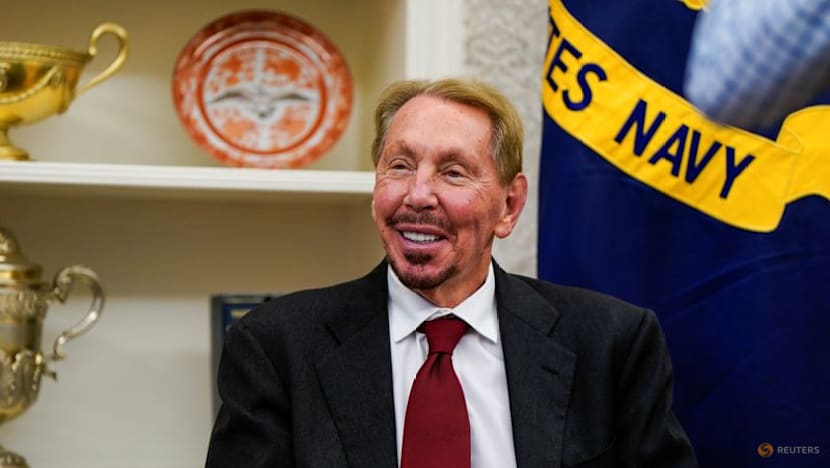Larry Ellison is back on top, 48 years after he co-founded Oracle

FILE PHOTO: Larry Ellison reacts, at the White House, in Washington, U.S. February 3, 2025. REUTERS/Elizabeth Frantz/File photo
SAN FRANCISCO :Fortune magazine wondered on its cover whether Oracle co-founder Larry Ellison might become the world's richest person, while BusinessWeek declared Ellison is "cool again," noting that "Silicon Valley's bad boy is having his revenge."
Both were published 25 years ago, but they could've run this week. The octogenarian Ellison is back in headlines after Oracle announced a clutch of cloud computing deals that rocked the tech world and sent its stock up 35.9 per cent, putting Ellison's fortune close to $400 billion, second globally only to Elon Musk.
Then on Thursday, news broke that Paramount, the media conglomerate Ellison's family now controls, is preparing a bid to buy out the storied Warner Bros Discovery, threatening overnight to dominate Hollywood and culture.
The swashbuckling billionaire may have been known more for his yacht collection, his ownership of a Hawaiian island or his longstanding support of Donald Trump.
More recently, with little fanfare, he has plotted his way back to the center of power. At Paramount, his son David appears to be tilting CBS News toward the right, tapping Trump supporter and former CEO of conservative think tank Hudson Institute Kenneth Weinstein as ombudsman for CBS News. He also is reportedly considering The Free Press's Bari Weiss for a leadership role at the news organization.
Ellison has also got his hands on TikTok. In 2022, Oracle began providing U.S. tech infrastructure to the short video-sharing platform after national security questions arose over the Chinese-owned service used by over 170 million Americans.
Some probably have forgotten that Ellison's brash tactics and lavish lifestyles earned him the role of bad boy of Silicon Valley since he co-founded Oracle in 1977.
In 2010, he played himself in "Iron Man 2." Remarkably, Ellison has honed a reputation as an uber tech titan and playboy while tackling decidedly unsexy, vexingly hard computing challenges. Recently, he helped figure out how to string together thousands of computers to run artificial intelligence systems.
Massive, AI-level money was more elusive until the latest quarter, when the cloud deals juiced Oracle's stock price.
Oracle vanquished database rivals in the 1990s, then missed nearly a decade of the sales and stock market gains from the wholesale shift of business applications to the cloud.
While AI shows tremendous promise for Oracle, success is far from certain, given that the entire industry is still working on a profitable business model. Also, Oracle has tied itself particularly closely to a single company - OpenAI, which, according to a person familiar with the matter, is committed to paying Oracle $300 billion for computing resources over five years.
DON'T COMPETE WITH NVIDIA
Oracle became an AI landlord, courting marquee customers including Meta and Elon Musk's xAI in addition to its new biggest client, OpenAI. That shift has helped booked revenue surge more than four-fold to $455 billion.
“People have definitely questioned him over the years," said Matthew Durot, deputy editor for wealth at Forbes, which calculates his fortune. With Oracle's focus on AI, "He’s sort of got the last laugh - at least for now."
One key decision helped: Oracle chose not to build custom AI chips like Microsoft, Amazon and Google. The decision to instead rely on Nvidia has likely helped it get more chips from the global leader of AI processors, analysts said. Ellison himself led the way.
At a dinner in 2024, Ellison took Musk and Nvidia CEO Jensen Huang to Nobu, his Palo Alto sushi restaurant. "Please take our money," Ellison said he told Huang. "It worked," Ellison added in an earnings call with equity analysts.
Within several months of that sushi dinner, Oracle landed more GPUs, closed a compute deal with OpenAI and announced a splashy half a trillion dollars OpenAI computing project, Stargate.
Oracle's first cloud venture in 2016 ended in business disaster but a second, launched in 2018, was a service that proved cheaper and more flexible than other offerings.
In 2020, when Zoom Technologies was buckling under a crush of new traffic during the pandemic, it tapped Oracle's cloud and its hiccups and outages all but vanished. In 2022, when TikTok moved the data of more than 100 million U.S. users to Oracle's cloud, the changeover went largely unnoticed by users. Analysts called this a major technical feat.
HUGE RISKS REMAIN
Ellison is known for piling up injuries in extreme sports, and Oracle's rush into AI shows a taste for risk.
The company does not buy land, build data centers or power plants. It outsources all those functions to partners, who may or may not come through, said Chirag Dekate, a vice president and analyst at research firm Gartner. It also remains to be seen whether partners such as OpenAI can amass the capital to pay Oracle, since OpenAI is still building a business it hopes will be profitable.
"When you have just one handful of customers, and one of those customers goes away, you are left with a really large hole that you now need to figure out how to fill," Dekate said.













